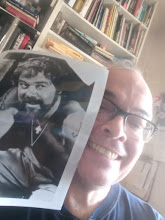
The Incredible Shrinking Man (1957)
The Monolith Monsters (1957)
“I felt puny and absurd, a ludicrous midget. Easy enough to talk of soul and spirit and existential worth, but not when you're three feet tall. I loathed myself, our home, the caricature my life with Lou had become. I had to get out. I had to get away.”
 Part of Universal’s “The Classic Sci-fi Ultimate Collection,” these films were re-released to DVD in early 2007. Although I don’t think Universal is marketing this collection as well as it should be (and I don’t like their box art, either, and refuse to include it), The Incredible Shrinking Man and The Monolith Monsters are a great double feature well worth renting—or even owning.
Part of Universal’s “The Classic Sci-fi Ultimate Collection,” these films were re-released to DVD in early 2007. Although I don’t think Universal is marketing this collection as well as it should be (and I don’t like their box art, either, and refuse to include it), The Incredible Shrinking Man and The Monolith Monsters are a great double feature well worth renting—or even owning.The Incredible Shrinking Man is just a great American film.
It’s not just a thoughtful and exciting action picture (man vs. cat, then spider are still thrilling scenes), but a fantastic metaphor for 1950s white collar, post-war, suburban existential angst—Shrinking Man is much better than The Man in the Gray Flannel Suit (and actually less heavy handed, if you ask me).

“A strange calm possessed me. I thought more clearly than I had ever thought before - as if my mind were bathed in a brilliant light. I recognized that part of my illness was rooted in hunger, and I remembered the food on the shelf, the cake thredded with spider web. I no longer felt hatred for the spider. Like myself it struggled blindly for the means to live.”
Shrinking Man works and remains fresh because it’s made in a matter-of-fact, straightforward style. It was a smart move letting Richard Matheson adapt his own novel—because with the exception of the main character’s shrinking, there are no other fantastic elements.

(And make sure to watch Shrinking Man’s trailer—there’s an endorsement from Orson Welles! I’d like to think that Welles genuinely liked the film, and not that he was shilling for producer Albert Zugsmith, who was also producing Welles’ Touch of Evil…)
Fun fact: The special effects technicians were having trouble un-miniaturizing water drops for when our hero is living in an empty matchbox on the basement floor. Director Jack Arnold remembered that as a kid, he and his pals would use condoms as water balloons, dropping them off roofs. Arnold recalled that as they fell, the condoms made a teardrop shape.
Director Jack Arnold remembered that as a kid, he and his pals would use condoms as water balloons, dropping them off roofs. Arnold recalled that as they fell, the condoms made a teardrop shape.
Pay attention next time you watch The Incredible Shrinking Man: you can see something is up with the water drops.
The Monolith Monsters is hardly perfect, but it is fun and smarter than average, like an episode of the original Outer Limits or one of the UK’s Quatermass films. It is a good flick to have as Shrinking Man’s double feature. Like Shrinking Man, this movie was also a staple on TV when I was growing up, so maybe it has a higher nostalgia quotient for me. But I think the image of those rocks growing and growing and then crashing down is one of those indelible 1950s sci-fi images, like the monster from the id from Forbidden Planet, or Harryhausen’s flying saucers over Washington D.C.
Like Shrinking Man, this movie was also a staple on TV when I was growing up, so maybe it has a higher nostalgia quotient for me. But I think the image of those rocks growing and growing and then crashing down is one of those indelible 1950s sci-fi images, like the monster from the id from Forbidden Planet, or Harryhausen’s flying saucers over Washington D.C.
“I was continuing to shrink, to become... what? The infinitesimal? What was I? Still a human being? Or was I the man of the future? If there were other bursts of radiation, other clouds drifting across seas and continents, would other beings follow me into this vast new world? So close - the infinitesimal and the infinite. But suddenly, I knew they were really the two ends of the same concept. The unbelievably small and the unbelievably vast eventually meet - like the closing of a gigantic circle. I looked up, as if somehow I would grasp the heavens. The universe, worlds beyond number, God's silver tapestry spread across the night. And in that moment, I knew the answer to the riddle of the infinite. I had thought in terms of man's own limited dimension. I had presumed upon nature. That existence begins and ends in man's conception, not nature's. And I felt my body dwindling, melting, becoming nothing. My fears melted away. And in their place came acceptance. All this vast majesty of creation, it had to mean something. And then I meant something, too. Yes, smaller than the smallest, I meant something, too. To God, there is no zero. I still exist!”














No comments:
Post a Comment